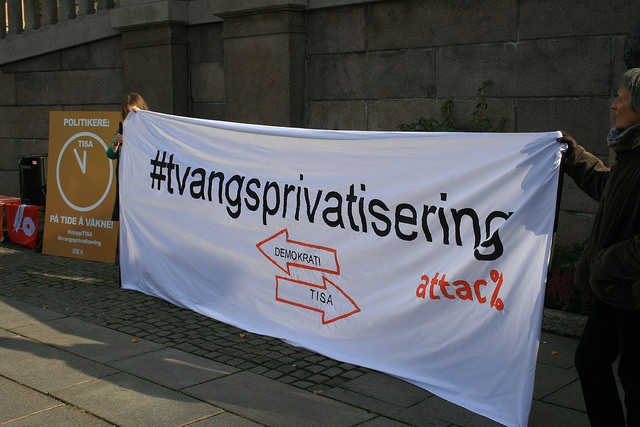A new leak of U.S. proposals to the ongoing Trade In Services Agreement (TISA) reveals that U.S. negotiators are seeking sweeping obligations that would lift restrictions on the cross-border movement and storage of data, and other rules that would undermine net neutrality and prohibit requirements that service suppliers site their servers within a specific country.
The Trade In Services Agreement (TISA) is an agreement being negotiated in secret on the sidelines of the World Trade Organization (WTO) by a group of 23 governments representing 50 countries, including Canada (the other countries involved are Australia, Chile, Chinese Taipei (Taiwan), Colombia, Costa Rica, Hong Kong, Iceland, Israel, Japan, Liechtenstein, Mexico, New Zealand, Norway, Pakistan, Panama, Paraguay, Peru, South Korea, Switzerland, Turkey, the United States, and the European Union, representing its 28 member states).
The group, which call itself the “Really Good Friends of Services” are responsible for over two-thirds of global trade in services, and includes some of the biggest proponents of service liberalization. TISA is an attempt by these countries to side-step the stalled WTO negotiations on service liberalization, with the goal of concluding and ambitious agreement and then to bring other countries under TISA’s disciplines in the future. Negotiations started in 2012. You can read recent reports by Scott Sinclair or Ellen Gould on the potential impacts of TISA.
This latest leak by Associated Whistle-Blowing Press is a seven-page document dated April 25, 2014, and is marked “confidential.” As with all TISA-related documents it was intended to remain secret for “five years from entry into force of the TISA agreement or, in no agreement enters into force, five years from the close of the negotiations.”
In it, the U.S. proposes rules to ban the requirement that a service provider be locally established or be required to make use of local content. Its proposals on the movement of information seek to ensure that corporations can move data in and out of other countries freely and process and store that data wherever they please rather than being required to store it within a signatory country’s territory to ensure privacy and data integrity. The rules on network access and use state that consumers should be able to “access and use services and applications of their choice available on the Internet, subject to reasonable network management” — a code for creating exceptions to the rules of net neutrality which ensure that internet service providers should treat all data on the internet equally.
“This leak reveals a dangerous trend where policies unrelated to trade are being diplomatically legislated through closed-door international ‘trade’ negotiations to which industry interests have privileged access while the public and policy experts promoting consumer interests are shut out,” according to Lori Wallach, director of U.S.-based Public Citizen’s Global Trade Watch.
You can read a full analysis on the leak and its implications written by University of Auckland law professor Jane Kelsey and Dr. Burcu Kilic of Public Citizen here.
Photo: GGAADD/flickr



